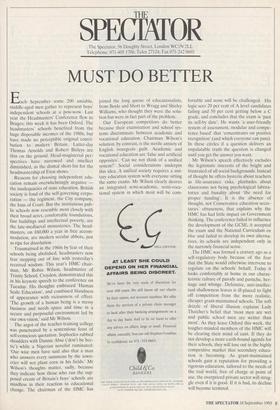SPECTATOR
The Spectator, 56 Doughty Street, London WCIN 2LL Telephone: 071-405 1706: Telex 27124; Fax 071-242 0603
MUST DO BETTER
Each September some 200 amiable, middle-aged men gather to represent boys' independent schools at a pow-wow. Last year the Headmasters' Conference flew to Bruges; this week it has been Oxford. The headmasters' schools benefited from the huge disposable incomes of the 1980s, but have made no perceptible original contri- bution to modern Britain. Latter-day Thomas Arnolds and Robert Birleys are thin on the ground. Head-magisterial per- spectives have narrowed and intellect diminished, as the dismal short-list for the headmastership of Eton shows.
Reasons for choosing independent edu- cation remain overwhelmingly negative the inadequacies of state education. British society is fond of the self-governing corpo- ration — the regiment, the City company, the Inns of Court. But the institutions pub- lic schools now resemble most closely with their broad acres, comfortable foundations, fine buildings and intellectual poverty, are the late-mediaeval monasteries. The head- masters, on £60,000 a year in free accom- modation, are modern secular abbots, just as ripe for dissolution.
Traumatised in the 1960s by fear of their schools being abolished, headmasters now fear stepping out of line with yesterday's received wisdom. This year's HMC chair- man, Mr Robin Wilson, headmaster of Trinity School, Croydon, demonstrated this in his keynote speech to the conference on Tuesday. His thoughts embraced 'Human Scale Education', and combined blandness of appearance with viciousness of effect. 'The growth of a human being is a messy business and needs space and time in a secure and purposeful environment led by our own vision,' said Mr Wilson.
The argot of the teacher-training college was punctuated by a sententious feast of self-conscious quotation. Sophocles rubbed shoulders with Dannie Abse ('don't be hec- tic') while a Nigerian novelist ruminated: 'Our wise men have said also that a man who answers every summons by the town- crier will not plant corn in his fields.' Mr Wilson's thoughts matter, sadly, because they indicate how those who run the sup- posed cream of Britain's boys' schools are mindless in their reaction to educational change. The chairman of the HMC has joined the long queue of educationalists, from Boyle and Short to Wragg and Shirley Williams, who thought they were the solu- tion but were in fact part of the problem.
Our European competitors do better because their examination and school sys- tems discriminate between academic and vocational education. Chairman Wilson's solution, by contrast, is the sterile anxiety of English bourgeois guilt. Academic and vocational education are 'false and artificial opposites'. 'Can we not think of a unified system?' Social considerations underpin this idea. A unified society requires a uni- tary education system with everyone sitting the same exams. Mr Wilson clearly desires an integrated semi-academic, semi-voca- tional system in which most will he corn-
fortable and none will be challenged. His logic sees 20 per cent of A level candidates failing and 50 per cent getting below a C grade, and concludes that the exam is 'past its sell-by date'. He wants 'a user-friendly system of assessment, modular and compe- tence based' that 'concentrates on positive recognition' (and which everyone can pass). In these circles if a question delivers an unpalatable truth the question is changed until you get the answer you want.
Mr Wilson's speech effectively excludes the legitimate interests of the bright and frustrated of all social backgrounds. Instead of thought he offers hysteria about teachers as life-assurance risks, platitudes about classrooms not being psychological labora- tories and banality about 'the need for proper funding'. It is the absence of thought, not Conservative education secre- taries' obtuseness, that explains why the HMC has had little impact on Government thinking. The conference failed to influence the development of the GCSE, it accepted the exam and the National Curriculum en bloc and failed to develop its own alterna- tives, its schools are independent only in the narrowly financial sense.
The HMC was formed a century ago as a self-regulatory body because of the fear that the State would otherwise intervene to regulate on the schools' behalf. Today it looks comfortably at home in our charac- teristic culture of parody and pastiche, her- itage and whinge. Defensive, anti-intellec- tual shallowness leaves it ill-placed to fight off competition from the more realistic, cheaper grant-maintained schools. The soft drizzle of liberal illusion explains Lady Thatcher's belief that 'most men are wet and public school men are wetter than most'. As they leave Oxford this week, the tougher-minded members of the HMC will be clearing their mind of cant. If they do not develop a more earth-bound agenda for their schools, they will lose out in the highly competitive market that secondary educa- tion is becoming. As grant-maintained schools gain a reputation for providing a rigorous education, tailored to the needs of the real world, free of charge at point of use, the overpriced private sector will strug- gle even if it is good. If it is bad, its decline will become terminal.


































































 Previous page
Previous page